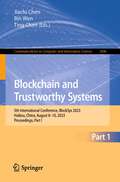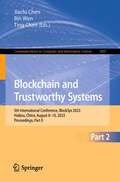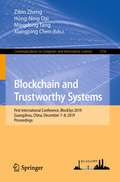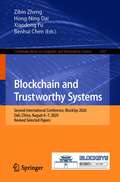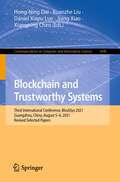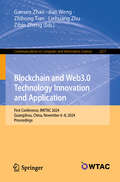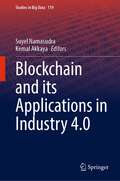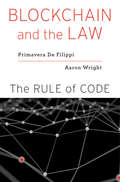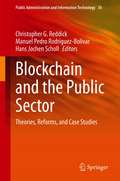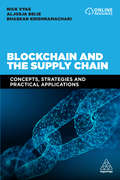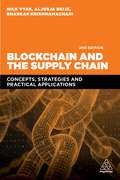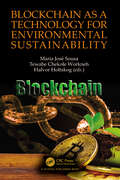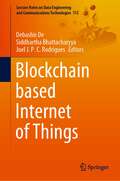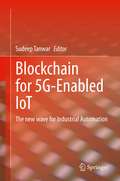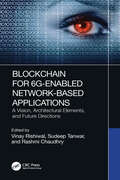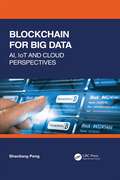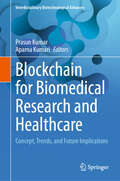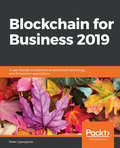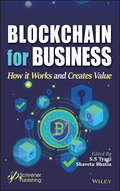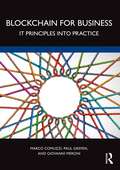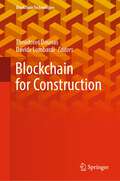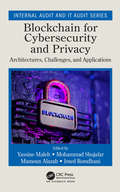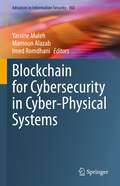- Table View
- List View
Blockchain and Supply Chain Logistics: Evolutionary Case Studies
by Atanu Chaudhuri Nachiappan Subramanian Yaşanur KayıkcıThis book introduces blockchain technology applications in supply chains. Blockchain is a relatively new tool, nevertheless, there have been considerable advances over the last five years, and blockchain is now poised to revolutionize the conventional supply chains with the offering of accountability and quality to the wider complex supply networks. Based on literature reviews and original research, this book serves as an essential introduction to blockchain and its applications in supply chain. The unique features of the book are empirical studies to demonstrate the application of blockchain technology in food, healthcare, manufacturing, transportation and retail sectors. Each chapter includes research framework and open research questions. Simple narration of concept and detailed insights from primary research information. Use case narrative will provoke the readers to demystify the myths in application of concepts in the supply chain . Overall, the book demystifies blockchain technology, reviews evolution and outlines its future applications by blending contents to meet the expectations of both academic and practice community.
Blockchain and Trustworthy Systems: 4th International Conference, BlockSys 2022, Chengdu, China, August 4–5, 2022, Revised Selected Papers (Communications in Computer and Information Science #1679)
by Yin Zhang Xiapu Luo Davor Svetinovic Xiaoyan Huang Xingping ChenThis book constitutes the thoroughly refereed post conference papers of the 4th International Conference on Blockchain and Trustworthy Systems, Blocksys 2022, held in Chengdu, China, in August 2022.The 26 full papers were carefully reviewed and selected from 56 submissions. The papers are organized in topical sections: Trustworthy Systems; Blockchain; Private Computing.
Blockchain and Trustworthy Systems: 5th International Conference, BlockSys 2023, Haikou, China, August 8–10, 2023, Proceedings, Part I (Communications in Computer and Information Science #1896)
by Jiachi Chen Bin Wen Ting ChenThe two-volume set CCIS 1896 and 1897 constitutes the refereed post-conference proceedings of the 5th International Conference on Blockchain and Trustworthy Systems, BlockSys 2023, which took place in Haikou, China during August 8–10, 2023. The 45 revised full papers presented in these proceedings were carefully reviewed and selected from 93 submissions. The papers are organized in the following topical sections: Part I: Anomaly detection on blockchain; edge intelligence and metaverse services; blockchain system security; empirical study and surveys; federated learning for blockchain. Part II: AI for blockchain; blockchain applications; blockchain architecture and optimization; protocols and consensus.
Blockchain and Trustworthy Systems: 5th International Conference, BlockSys 2023, Haikou, China, August 8–10, 2023, Proceedings, Part II (Communications in Computer and Information Science #1897)
by Jiachi Chen Bin Wen Ting ChenThe two-volume set CCIS 1896 and 1897 constitutes the refereed post-conference proceedings of the 5th International Conference on Blockchain and Trustworthy Systems, BlockSys 2023, which took place in Haikou, China during August 8–10, 2023. The 45 revised full papers presented in these proceedings were carefully reviewed and selected from 93 submissions. The papers are organized in the following topical sections: Part I: Anomaly detection on blockchain; edge intelligence and metaverse services; blockchain system security; empirical study and surveys; federated learning for blockchain. Part II: AI for blockchain; blockchain applications; blockchain architecture and optimization; protocols and consensus.
Blockchain and Trustworthy Systems: First International Conference, BlockSys 2019, Guangzhou, China, December 7–8, 2019, Proceedings (Communications in Computer and Information Science #1156)
by Zibin Zheng Hong-Ning Dai Mingdong Tang Xiangping ChenThis book constitutes the thoroughly refereed post conference papers of the First International Conference on Blockchain and Trustworthy Systems, Blocksys 2019, held in Guangzhou, China, in December 2019.The 50 regular papers and the 19 short papers were carefully reviewed and selected from 130 submissions. The papers are focus on Blockchain and trustworthy systems can be applied to many fields, such as financial services, social management and supply chain management.
Blockchain and Trustworthy Systems: Second International Conference, BlockSys 2020, Dali, China, August 6–7, 2020, Revised Selected Papers (Communications in Computer and Information Science #1267)
by Zibin Zheng Hong-Ning Dai Xiaodong Fu Benhui ChenThis book constitutes the thoroughly refereed post conference papers of the Second International Conference on Blockchain and Trustworthy Systems, Blocksys 2020, held in Dali, China*, in August 2020.The 42 full papers and the 11 short papers were carefully reviewed and selected from 100 submissions. The papers are organized in topical sections: theories and algorithms for blockchain, performance optimization of blockchain, blockchain security and privacy, blockchain and cloud computing, blockchain and internet of things, blockchain and mobile edge computing, blockchain and smart contracts, blockchain and data mining, blockchain services and applications, trustworthy system development.*The conference was held virtually due to the COVID-19 pandemic.
Blockchain and Trustworthy Systems: Third International Conference, BlockSys 2021, Guangzhou, China, August 5–6, 2021, Revised Selected Papers (Communications in Computer and Information Science #1490)
by Hong-Ning Dai Xiangping Chen Xuanzhe Liu Daniel Xiapu Luo Jiang XiaoThis book constitutes the thoroughly refereed post conference papers of the Third International Conference on Blockchain and Trustworthy Systems, Blocksys 2021, held in Guangzhou, China, in August 2021.*The 38 full papers and the 12 short papers were carefully reviewed and selected from 98 submissions. The papers are organized in topical sections: Contents Blockchain and Data Mining; Performance Optimization of Blockchain; Blockchain Security and Privacy; Theories and Algorithms for Blockchain; Blockchain and Internet of Things; Blockchain and Smart Contracts; Blockchain Services and Applications; Trustworthy System Development.*
Blockchain and Web3.0 Technology Innovation and Application: First Conference, BWTAC 2024, Guangzhou, China, November 6–8, 2024, Proceedings (Communications in Computer and Information Science #2277)
by Zibin Zheng Gansen Zhao Liehuang Zhu Jian Weng Zhihong TianThis book constitutes the refereed proceedings of the First Conference on Blockchain and Web3 Technology Innovation and Application, BWTAC 2024, held in Guangzhou, China, during, November 6–8, 2024. The 36 full papers and 9 short papers included in this book were carefully reviewed and selected from 106 submissions. They were categorized in the following topica sections: Architectures and Technologies, Privacy Protection and Data Security, Artificial Intelligences, Security, Trading Systems, Cross Domains Applications and Emerging Technologies.
Blockchain and its Applications in Industry 4.0 (Studies in Big Data #119)
by Suyel Namasudra Kemal AkkayaThis book discusses fundamentals of Blockchain technology and Industry 4.0. It discusses many applications of Blockchain technology in Industry 4.0, including integration of AI, IoT, and big data with Blockchain for Industry 4.0. It provides cutting-edge research content from researchers, academicians, and other professionals from different background areas to show their state-of-the-art knowledge to use Blockchain in Industry 4.0. The book discusses advantages of Industry 4.0, such as improved productivity, improved efficiency, flexibility, agility, better user experience, and many more, and also entails some challenges too, such as trust, traceability, security, reliability, transparency, etc., for creating an application of Industry 4.0. The book helps graduate, postgraduate, doctoral students, and industrial professionals to implement Blockchain in Industry 4.0.
Blockchain and the Law: The Rule of Code
by Primavera De De FilippiSince Bitcoin appeared in 2009, the digital currency has been hailed as an Internet marvel and decried as the preferred transaction vehicle for all manner of criminals. It has left nearly everyone without a computer science degree confused: Just how do you “mine” money from ones and zeros? The answer lies in a technology called blockchain, which can be used for much more than Bitcoin. A general-purpose tool for creating secure, decentralized, peer-to-peer applications, blockchain technology has been compared to the Internet itself in both form and impact. Some have said this tool may change society as we know it. Blockchains are being used to create autonomous computer programs known as “smart contracts,” to expedite payments, to create financial instruments, to organize the exchange of data and information, and to facilitate interactions between humans and machines. The technology could affect governance itself, by supporting new organizational structures that promote more democratic and participatory decision making. Primavera De Filippi and Aaron Wright acknowledge this potential and urge the law to catch up. That is because disintermediation—a blockchain’s greatest asset—subverts critical regulation. By cutting out middlemen, such as large online operators and multinational corporations, blockchains run the risk of undermining the capacity of governmental authorities to supervise activities in banking, commerce, law, and other vital areas. De Filippi and Wright welcome the new possibilities inherent in blockchains. But as Blockchain and the Law makes clear, the technology cannot be harnessed productively without new rules and new approaches to legal thinking.
Blockchain and the Public Sector: Theories, Reforms, and Case Studies (Public Administration and Information Technology #36)
by Christopher G. Reddick Manuel Pedro Rodríguez-Bolívar Hans Jochen SchollThis book discusses blockchain technology and its potential applications in digital government and the public sector. With its robust infrastructure and append-only record system, blockchain technology is being increasingly employed in the public sector, specifically where trustworthiness and security are of importance. Written by leading scholars and practitioners, this edited volume presents challenges, benefits, regulations, frameworks, taxonomies, and applications of blockchain technology in the public domain.Specifically, the book analyzes the implementation of blockchain technologies in the public sector and the potential reforms it would bring. It discusses emerging technologies and their role in the implementation of blockchain technologies in the public sector. The book details the role of blockchain in the creation of public value in the delivery of public sector services. The book analyzes effects, impacts, and outcomes from the implementation of blockchain technologies in the public sector in select case studies.Providing up-to-date information on important developments regarding blockchain in government around the world, this volume will appeal to academics, researchers, policy-makers, public managers, international organizations, and technical experts looking to understand how blockchain can enhance public service delivery.
Blockchain and the Supply Chain: Concepts, Strategies and Practical Applications
by Bhaskar Krishnamachari Nick Vyas Aljosja BeijeBlockchain can transform companies, if it is successfully integrated into existing supply chain ecosystems and practices. Some of the key benefits are dispute resolution, foolproof track and trace, event management, operational as well as financial transparency, speed to market, visibility, elimination of heavy reliance on intermediary, integration of IoT technology, machine learning, and artificial intelligence. Blockchain and the Supply Chain highlights how blockchain can enable opportunities within the end-to-end supply chain.The team of authors look at the evolution of the network, systems and finance, as well as basics of blockchain such as peer-to-peer transactions, consensus based algorithms and smart contracts. They include cases which highlight the opportunities within the different nodes of systems, sales and operations planning and provide practical examples from specific supply chains, such as the movement of temperature controlled goods, dry goods and precious commodities, as well as general cargo flow. Blockchain and the Supply Chain examines the business case for blockchain, including increased efficiency of transactions. It also covers the broader set of technologies relevant to supply chain, such as IoT, Big Data and Cyber Security basics and the capabilities they offer.
Blockchain and the Supply Chain: Concepts, Strategies and Practical Applications
by Bhaskar Krishnamachari Nick Vyas Aljosja BeijeBlockchain is a transformative driver for change in all industries. Learn from the latest research and case studies how this technology can and will be used to revolutionize supply chain management.Blockchain and the Supply Chain provides a complete overview of blockchain and the key benefits of integrating this technology into the supply chain. This textbook explains how track and trace can be improved, transaction efficiency increased, visibility enhanced, and more through blockchain. With extensive case studies, learning is underpinned by practical insights as well as cutting-edge research. Clear and accessible information is provided to students on how blockchain will affect supply chain processes, metrics and performance and how to capitalize on the potential of this technology.The fully revised new edition includes the latest information on Enterprise Blockchain, Ethereum and Hyperledger. Focus is also placed on the application of Cloud, Internet of Things (IoT), Machine learning (ML) and other technologies that support supply chains and their integration with blockchain. This textbook highlights how to use blockchain as an enabler and key driver for solutions in the end-to-end supply chain. Online resources include lecture slides and example assignments and quizzes.
Blockchain as a Technology for Environmental Sustainability
by Halvor Holtskog Maria José Tewabe Chekole WorknehAt a time of growing environmental concerns and an urgent need for sustainable solutions, the intersection of blockchain technology and environmental sustainability is emerging as a powerful force for positive change. The environmental challenges of our time, including climate change, resource scarcity and the destruction of ecosystems, require innovative solutions that transcend geographical and political boundaries. Blockchain technology, with its decentralized and transparent nature, can not only track and verify environmental efforts, but also incentivize them.
Blockchain based Internet of Things (Lecture Notes on Data Engineering and Communications Technologies #112)
by Debashis De Siddhartha Bhattacharyya Joel J. P. C. RodriguesThe book is aimed to foster knowledge based on Blockchain technology highlighting on the framework basics, operating principles and different incarnations. The fundamental problems encountered in existing blockchain architectures and means for removing those would be covered. It would also touch upon blockchain based IoT systems and applications. The book covers applications and use cases of blockchain technology for industrial IoT systems. In addition, methods for inducing computational intelligence into existing blockchain frameworks thereby thwarting most of the limitations are also discussed. The readers would benefit from the rich technical content in this rapidly emerging field thereby enabling a skilled workforce for the future.
Blockchain for 5G-Enabled IoT: The new wave for Industrial Automation
by Sudeep TanwarThis book addresses one of the most overlooked practical, methodological, and moral questions in the journey to secure and handle the massive amount of data being generated from smart devices interactions: the integration of Blockchain with 5G-enabled IoT. After an overview, this book discusses open issues and challenges, which may hinder the growth of Blockchain technology. Then, this book presents a variety of perspectives on the most pressing questions in the field, such as: how IoT can connect billions of objects together; how the access control mechanisms in 5G-enabled industrial environment works; how to address the real-time and quality-of-service requirements for industrial applications; and how to ensure scalability and computing efficiency. Also, it includes a detailed discussions on the complexity of adoption of Blockchain for 5G-Enabled IoT and presents comparative case studies with respect to various performance evaluation metrics such as scalability, data management, standardization, interoperability and regulations, accessibility, human-factors engineering and interfaces, reliability, heterogeneity, and QoS requirements. This book acts as a professional guide for the practitioners in information security and related topics.
Blockchain for 6G-Enabled Network-Based Applications: A Vision, Architectural Elements, and Future Directions
by Sudeep Tanwar Vinay Rishiwal Rashmi ChaudhryThis book provides a comprehensive overview of blockchain for 6G-enabled network-based applications. Following the key services of blockchain technology, this book will be instrumental to ideate and understand the necessities, challenges, and various case studies of different 6G-based applications. The emphasis is on understanding the contributions of blockchain technology in 6G-enabled applications, and its aim is to give insights into evolution, research directions, challenges, and the ways to empower 6G applications through blockchain. The book consistently emphasizes the missing connection between blockchain and 6G-enabled network applications. The entire ecosystem between these two futuristic technologies is explained in a comprehensive manner. The book constitutes a one-stop guide to students, researchers, and industry professionals. The book progresses from a general introduction toward more technical aspects while remaining easy to understand throughout. Comprehensive elaboration of material is supplemented with examples and diagrams, followed by easily understandable approaches with regard to technical information given thereon. Blockchain and its applications in 6G-enabled applications can drive many powerful solutions to real-world technical, scientific, and social problems. This book presents the most recent and exciting advances in blockchain for 6G-enabled network applications. Overall, this book is a complete outlet and is designed exclusively for professionals, scientists, technologists, developers, designers, and researchers in network technologies around blockchain integration with IoT, blockchain technology, information technology, and 6G-enabled industrial applications. Secondary readers include professionals involved in policy making and administration, security of public data and law, network policy developers, blockchain technology experts, regulators, and decision makers in government administrations.
Blockchain for Big Data: AI, IoT and Cloud Perspectives
by Shaoliang PengIn recent years, the fast-paced development of social information and networks has led to the explosive growth of data. A variety of big data have emerged, encouraging researchers to make business decisions by analysing this data. However, many challenges remain, especially concerning data security and privacy. Big data security and privacy threats permeate every link of the big data industry chain, such as data production, collection, processing, and sharing, and the causes of risk are complex and interwoven. Blockchain technology has been highly praised and recognised for its decentralised infrastructure, anonymity, security, and other characteristics, and it will change the way we access and share information. In this book, the author demonstrates how blockchain technology can overcome some limitations in big data technology and can promote the development of big data while also helping to overcome security and privacy challenges. The author investigates research into and the application of blockchain technology in the field of big data and assesses the attendant advantages and challenges while discussing the possible future directions of the convergence of blockchain and big data. After mastering concepts and technologies introduced in this work, readers will be able to understand the technical evolution, similarities, and differences between blockchain and big data technology, allowing them to further apply it in their development and research.Author:Shaoliang Peng is the Executive Director and Professor of the College of Computer Science and Electronic Engineering, National Supercomputing Centre of Hunan University, Changsha, China. His research interests are high-performance computing, bioinformatics, big data, AI, and blockchain.
Blockchain for Biomedical Research and Healthcare: Concept, Trends, and Future Implications (Interdisciplinary Biotechnological Advances)
by Prasun Kumar Aparna KumariBlockchain is a new type of technology that combines and secures information exchange between different stakeholders such as medical practitioners, patients, healthcare providers, and other applicable parties. Among them, Blockchain Technology is one of the most important areas in the bioinformatics application of biomedical research and healthcare systems utilizing unique requirements and integration features. All the chapters are written by experts and researchers working in various areas of the biomedical and healthcare domain and they also dive into one of the most overlooked methodological, practical, and moral questions to secure and handle the enormous amount of data being generated from IoT-enabled biomedical and healthcare systems. In the beginning, this book presents an overview and then discusses open issues, challenges, and applicability aspect of Blockchain technology in healthcare. Then, this book presents a variety of perspectives on the most pressing questions in the field, for example: how IoT can connect billions of biomedical and healthcare information; how the blockchain-based secure access control mechanisms in biomedical and healthcare work; how to address the Quality-of-Service (QoS) and real-time accessibility requirements for healthcare applications; and how to ensure communication with efficiency. Also, it discusses Blockchain for IoT-enabled healthcare systems and presents a comparative analysis with respect to various performance evaluation metrics too.
Blockchain for Business 2019: A user-friendly introduction to blockchain technology and its business applications
by Peter LipovyanovYour one-stop guide to blockchain technology and its business applications Key Features Assimilate blockchain services such as Ethereum and Hyperledger to transform industrial applications Know in and out of blockchain technology to understand various business use cases Understand various common and not-so-common challenges faced in blockchain development Book Description Blockchain for Business 2019 is a comprehensive guide that enables you to bring in various blockchain functionalities to extend your existing business models and make correct fully-informed decisions. You will learn how decentralized applications are transforming numerous business sectors that are expected to play a huge role in the future. You will see how large corporations are already implementing blockchain technology now. You will then learn about the various blockchain services, such as Bitcoin, Ethereum, Hyperledger, and others to understand their use cases in a variety of business domains. You will develop a solid fundamental understanding of blockchain architecture. Moving ahead, you will get to grips with the inner workings of blockchain, with detailed explanations of mining, decentralized consensus, cryptography, smart contracts, and many other important concepts. You will delve into a realistic view of the current state of blockchain technology, along with its issues, limitations, and potential solutions that can take it to the next level. By the end of this book, you will all be well versed in the latest innovations and developments in the emerging blockchain space. What you will learn Understand the fundamentals of blockchain and how it was developed Gain a good understanding of economic concepts and developments Develop a base for concepts such as cryptography, computer networking, and programming Understand the applications of blockchain and its potential impact on the world Become well versed with the latest developments in the blockchain space Explore blockchain frameworks, including decentralized organizational structures, networks, and applications Who this book is for This book is for financial professionals, business executives, managers, and enthusiasts who are interested in getting well-versed with blockchain technology in various business domains. This book will help boost your existing business models using blockchain services. No prior experience of blockchain is required.
Blockchain for Business: How it Works and Creates Value
by S. S. Tyagi Shaveta BhatiaThe book focuses on the power of business blockchain. It gives an overview of blockchain in traditional business, marketing, accounting and business intelligence. The book provides a detailed working knowedge of blockchain, user cases of blockchain in business, cryptocurrency and Initial Coin Offering(ICO) along with the risks associated with them. The book also covers the detailed study of decentralization, mining, consensus, smart contracts, concepts and working of distributed ledgers and hyper ledgers as well as many other important concepts. It also details the security and privacy aspects of blockchain. The book is beneficial for readers who are preparing for their business careers, those who are working with small scale businesses and startups, and helpful for business executives, managers, entrepreneurs, bankers, government officials and legal professionals who are looking to blockchain for secure financial transactions. The book will also be beneficial for researchers and students who want to study the latest developments of blockchain.
Blockchain for Business: IT Principles into Practice
by Paul Grefen Giovanni Meroni Marco ComuzziThis book discusses the up-and-coming blockchain technology in a structured way from the conceptual, technological, and business perspectives, thereby providing the integrated insight that is essential for truly understanding blockchain applications and their impact. While most people may know about blockchain from Bitcoin and news about its price in the financial markets, blockchain is a technology that increasingly permeates the way in which modern businesses operate. However, its dynamics and functioning remain obscure for most people. This book gives readers the tools to understand the full extent to which blockchain technology is or can be used in business. First, the book focuses on the functioning of blockchain systems, introducing basic concepts such as transactions, consensus mechanisms, and smart contracts, as well as giving a smooth introduction to the basic features of cryptography that underpin blockchain technology, e.g., digital signatures and hashing. Then, the book focuses on specific blockchain platforms (Bitcoin, Ethereum, private blockchain platforms) currently used for the implementation of cryptocurrencies and other blockchain systems. Finally, it introduces a set of tools to understand and analyze the suitability of blockchain technology in different business scenarios from the business model, and business operation perspectives. Examples and case studies of blockchain applications currently in production are discussed extensively across the book. This book targets students and educators with an interest in blockchain technology providing a one-stop shop to obtain a deep and complete insight in blockchain technology and its applicability in different business scenarios. The textbook is designed primarily for third and fourth year undergraduate students in industrial engineering, business and management, and information systems. However, it can be adopted also in the computer science majors, since it does not strictly require any specific pre-requisite knowledge. At the graduate level, this book can be used in courses for industrial engineering, information systems, and management students. Finally, the book is also of interest to practitioners, like business analysts, process analysts, and information system architects, to understand the enabling and transformative potential of blockchain in a given business scenario.
Blockchain for Construction (Blockchain Technologies)
by Theodoros Dounas Davide LombardiThis book highlights the design, use and structure of blockchain systems and decentralized ledger technologies (B/DLT) for use in the construction industry. Construction remains a fragmented change-resistant industry with chronic problems of underproductivity and a very low digitization factor compared to other fields. In parallel, the convergence, embedding and coordination of digital technologies in the physical world provides a unique opportunity for the construction industry to leap ahead and adopt fourth industrial revolution technologies. Within this context, B/DLT are an excellent fit for the digitization of the construction industry. B/DLT are effective in this as they organize and align digital and physical supply chains, produce stigmergic coordination out of decentralization, enable the governance of complex projects for multiple stakeholders, while enabling the creation of a new class of business models and legal instruments for construction.
Blockchain for Cybersecurity and Privacy: Architectures, Challenges, and Applications (Internal Audit and IT Audit)
by Imed Romdhani Yassine Maleh Mamoun Alazab Mohammad ShojafarBlockchain technology is defined as a decentralized system of distributed registers that are used to record data transactions on multiple computers. The reason this technology has gained popularity is that you can put any digital asset or transaction in the blocking chain, the industry does not matter. Blockchain technology has infiltrated all areas of our lives, from manufacturing to healthcare and beyond. Cybersecurity is an industry that has been significantly affected by this technology and may be more so in the future. Blockchain for Cybersecurity and Privacy: Architectures, Challenges, and Applications is an invaluable resource to discover the blockchain applications for cybersecurity and privacy. The purpose of this book is to improve the awareness of readers about blockchain technology applications for cybersecurity and privacy. This book focuses on the fundamentals, architectures, and challenges of adopting blockchain for cybersecurity. Readers will discover different applications of blockchain for cybersecurity in IoT and healthcare. The book also includes some case studies of the blockchain for e-commerce online payment, retention payment system, and digital forensics. The book offers comprehensive coverage of the most essential topics, including: Blockchain architectures and challenges Blockchain threats and vulnerabilities Blockchain security and potential future use cases Blockchain for securing Internet of Things Blockchain for cybersecurity in healthcare Blockchain in facilitating payment system security and privacy This book comprises a number of state-of-the-art contributions from both scientists and practitioners working in the fields of blockchain technology and cybersecurity. It aspires to provide a relevant reference for students, researchers, engineers, and professionals working in this particular area or those interested in grasping its diverse facets and exploring the latest advances on the blockchain for cybersecurity and privacy.
Blockchain for Cybersecurity in Cyber-Physical Systems (Advances in Information Security #102)
by Imed Romdhani Yassine Maleh Mamoun AlazabThis book offers the latest research results on blockchain technology and its application for cybersecurity in cyber-physical systems (CPS). It presents crucial issues in this field and provides a sample of recent advances and insights into the research progress. Practical use of blockchain technology is addressed as well as cybersecurity and cyber threat challenges and issues. This book also offers readers an excellent foundation on the fundamental concepts and principles of blockchain based cybersecurity for cyber-physical systems. It guides the reader through the core ideas with expert ease.Blockchain technology has infiltrated all areas of our lives, from manufacturing to healthcare and beyond. Cybersecurity is an industry that has been significantly affected by this technology, and maybe more so in the future. This book covers various case studies and applications of blockchain in various cyber-physical fields, such as smart cities, IoT, healthcare, manufacturing, online fraud, etc.This book is one of the first reference books covering the application of blockchain technology for cybersecurity in cyber-physical systems (CPS). Researchers working in the cybersecurity field and advanced-level students studying this field will find this book useful as a reference. Decision-makers, managers and professionals also working in this field will want to purchase this book.


